Student Well Being
Student Well-Being
In the six years of Primary education in RVPS, our students will experience joyful moments and encounter challenging situations in their lives, both in school and at home. Our teachers play a key role in establishing a Caring and Enabling School Environment to proactively monitor and support our students’ well-being and holistic development by fostering a nurturing learning environment and cultivating positive teacher-student relationships and peer relationship as these are the powerful protective factors for student well-being.
Termly Check-In Surveys
Changes that can affect a student’s well-being could take place at any time of the year. The check-in surveys (MOE Check-In Survey – Term 1 and 3 and RVPS Student Perception Survey – Term 2 and 4) provide students with a safe and regular channel to share information about themselves. Form teachers can obtain a sensing of their students’ social support network and well-being and recognize warning signs in their students during lesson activities and/or from their responses to the check-in surveys. Form teachers can then follow up on these signs and check-in with the students.
CCE lesson - Form Teacher Guidance Period (FTGP)
CCE FTGP is one of the key learning platforms where Form Teachers enact teaching and learning of CCE intentionally to explicitly teach values, and social and emotional skills, which addresses the holistic developmental needs of our students, equipping them with the knowledge and skills to better understand and navigate the real-world, e.g. understand metal health issues, navigate cyberspace responsibly, make appropriate educational and career choices, appreciate family life, understand Singapore’s racial and religious diversity. CCE FTGP also ties in with Peer Support and Cyber Wellness topics and is a platform for teachers to reinforce these key messages to students.
One-To-One Conversation
The check-in surveys’ findings are used as a conversation starter by the form teachers to connect with their students during the One-To-One Conversation on a weekly basis. The One-To-One Conversation are tiered according to the various levels to support the developmental needs of our students progressively and build their self-esteem and self-awareness based on the three CCE themes of Becoming My Best Self, Building Connections and Making Choices.
Peer Support and Relationship
A strong peer support culture can provide timely alerts to teachers and allow prompt support and intervention. In RVPS, we adopt the tiered peer support approach. The tiered peer support strategy is a great way to foster a sense of responsibility and community among students. By involving everyone in the first tier through Peer Bonding, Peer Helping, and Peer Influencing, we are encouraging empathy and collaboration from the very beginning. The second tier with Peer Support Ambassadors also adds an extra layer of leadership and support, allowing for more focused attention on students who might need additional help.
Cyber Wellness
In River Valley Primary School, we aim to equip our students with the knowledge and skills to harness the power of technology for positive purposes, maintain a positive presence in the cyberspace and be safe and responsible users of technology. Through the Cyber Wellness programmes and activities, students understand the norms of responsible behaviour regarding technology use as well as knowledge, skills, values and attitudes on how to protect oneself and other users in the cyber world through the key topics of Cyber Use, Cyber Relationships, Cyber Identity, Cyber Citizenship and Cyber Ethics. We adopt the tiered approach by involving everyone in the first tier so that students are responsible for their personal well-being in the cyberspace. The second tier with Cyber Wellness Ambassadors adds an additional layer of leadership in navigating the online space, spreading awareness and advocating for the safe and responsible online use.
Students learn the three principles: ‘Respect for Self and Others’, ‘Safe and Responsible Use’ and ‘Positive Peer Influence’ to guide their decision-making and anchor their well-being in the cyber world. Through Cyber Wellness programme in the school, students are reminded to:
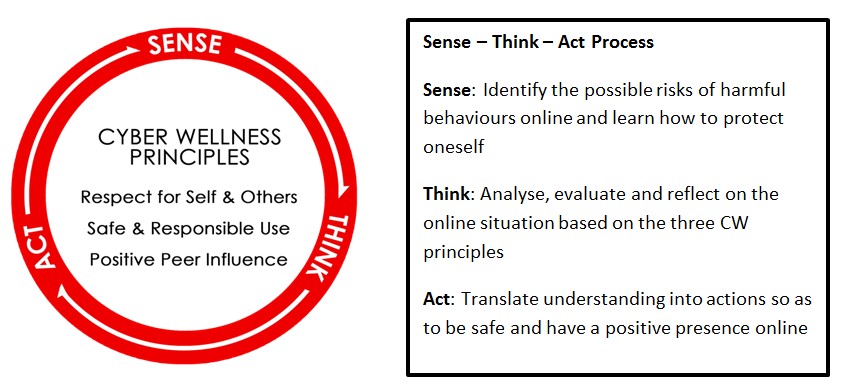
The Surfer Six
The Surfer Six are heroes who impart their wisdom of Cyber Wellness to RVians. With the knowledge, RVians learn to respect self and others, be responsible users, keep safe and also be a positive influence in the cyber world.
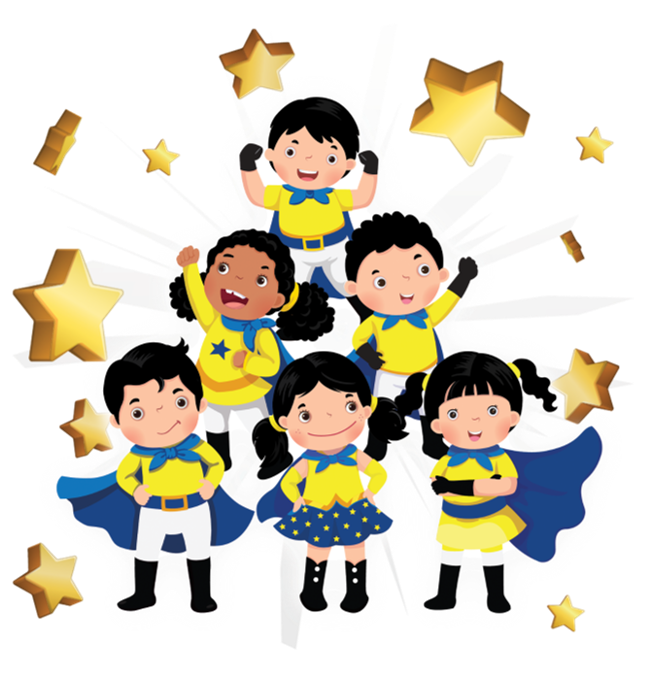

|
Stay Safe StanleyStay Safe Online Careful what you share online Keep your personal information private Maintain a positive online presence Check your digital footprint Remove inappropriate images or posts of yourself |
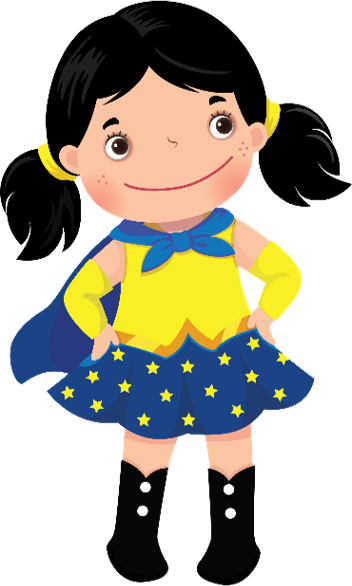
|
Netiquette NadirahThink before you post Think about how your online post can be misunderstood by others Stay calm online Don’t be too quick to take offense If unsure, clarify |

|
Balance Bin BinBalanced use of technology Maintain healthy balance between online and offline activity |
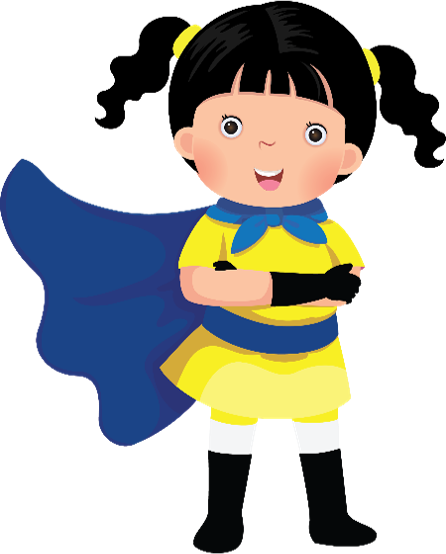
|
Credible CandiceCredibility of sources and content appropriateness Check the source – Where does the source come from? Check the content – Is it something dangerous? |

|
Respectful RileyBe kind and respect each other online Respect privacy of others and care for others online Practice asking for consent before posting photos or videos online Do not spread rumours of others |
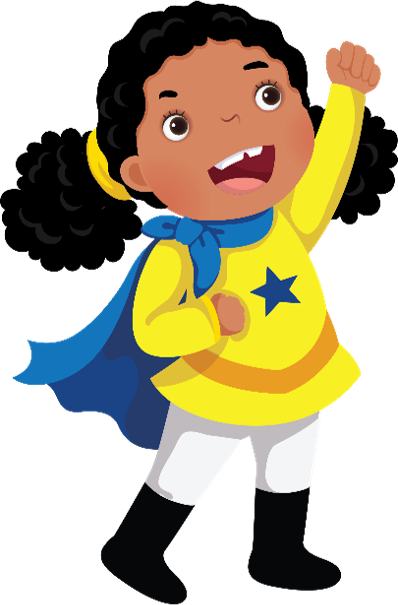
|
Supportive ShantiBe a positive peer influence Be courteous online and offline Share healthy and positive content with friends |
The partnership between parents and children is essential in promoting safe and responsible digital use. The Ministry of Health’s updated guidance provides a clear indication for how parents can manage their children's screen time, especially in an age where technology is an integral part of daily life. By limiting screen time to under two hours per day for children aged 7-12, and ensuring that it is primarily for educational purposes, parents can help create a healthy balance between online and offline activities.
Here are some practical ways parents can reinforce cyber wellness at home:
-
Set Parental Controls and Discuss Family Guidelines: Establishing parental controls on devices and discussing clear rules with the children is vital. This allows for more transparency and shared understanding of what's appropriate, while also promoting a sense of responsibility.
-
Have Open Conversations About Digital Use: Encourage regular, open conversations about your child's online experiences. This helps parents stay informed and connected to what their children are doing online, and it provides a chance to address any concerns.
-
Be Involved and Engaged: Show genuine interest in your child's online interests and activities. This not only strengthens your relationship but also gives you the opportunity to guide them on making thoughtful and respectful decisions when using technology.
-
Encourage Time Management: Help your child monitor their screen time by discussing how much time they are spending online and guiding them in managing it. This can be an opportunity to teach them how to strike a balance between engaging in digital activities and enjoying offline hobbies or spending time with family and friends.
-
Turn Online Activities into Bonding Moments: Rather than seeing digital time as a solitary activity, try to incorporate shared moments like co-viewing videos, playing video games together, or discussing interesting online content. This helps foster communication and strengthens bonds while also reinforcing digital wellness in a fun, engaging way.
Involving children in discussions about their digital lives and offering guidance helps to foster responsible digital citizens who can enjoy the benefits of technology while minimizing its risks. By taking an active role, parents can support their children in becoming mindful and balanced users of digital devices.
Here are some resources from the Ministry of Education on Cyber Wellness:
Level Initiatives
Writing Notes of Encouragement
River Valley Primary School fosters a sense of community and care among its students. Encouragement and support like this can truly make a difference, not just in academic performance, but also in building empathy and solidarity between students of different ages.
The idea of having the Primary 3 students write motivational notes to the Primary 6 students before their PSLE is a thoughtful act. It encourages the younger students to take pride in supporting their older peers, while also helping the Primary 6 students feel uplifted and supported during a stressful time. And the reciprocation—Primary 6 students writing back to their Primary 3 buddies before the Primary 3 own Semestral Assessment—is a beautiful way to complete the circle of care and positivity.
By engaging in this activity, the students not only work on academic success but also develop emotional intelligence, kindness, and collaboration, which will help them throughout their lives. It is definitely a powerful way to create a culture of care in River Valley Primary School.
P1 and P4 Buddy during Orientation
Having the Primary 4 students as buddies is a great approach to help the Primary 1 students adjust to the new school environment, as it not only makes them feel welcomed but also encourages the older students to take on leadership roles and become role models.
The welcome card is a personal touch that helps the Primary 1 students feel special and supported from the very beginning. It is such a warm way to kickstart their school experience. The Primary 4 students' role in showing the Primary 1 students the basics of school life, like washing hands before eating, queuing for food, and cleaning up afterward, teaches the little ones important habits and routines in a caring and patient way. It also allows the Primary 4 students to practice responsibility, patience, and empathy.

